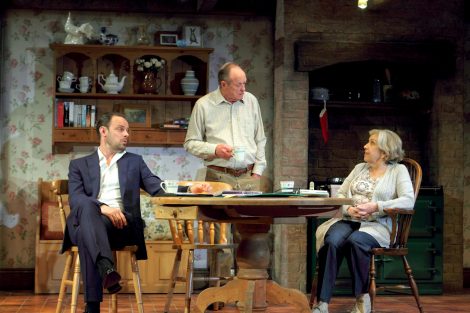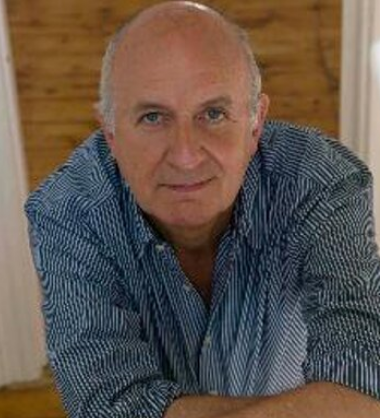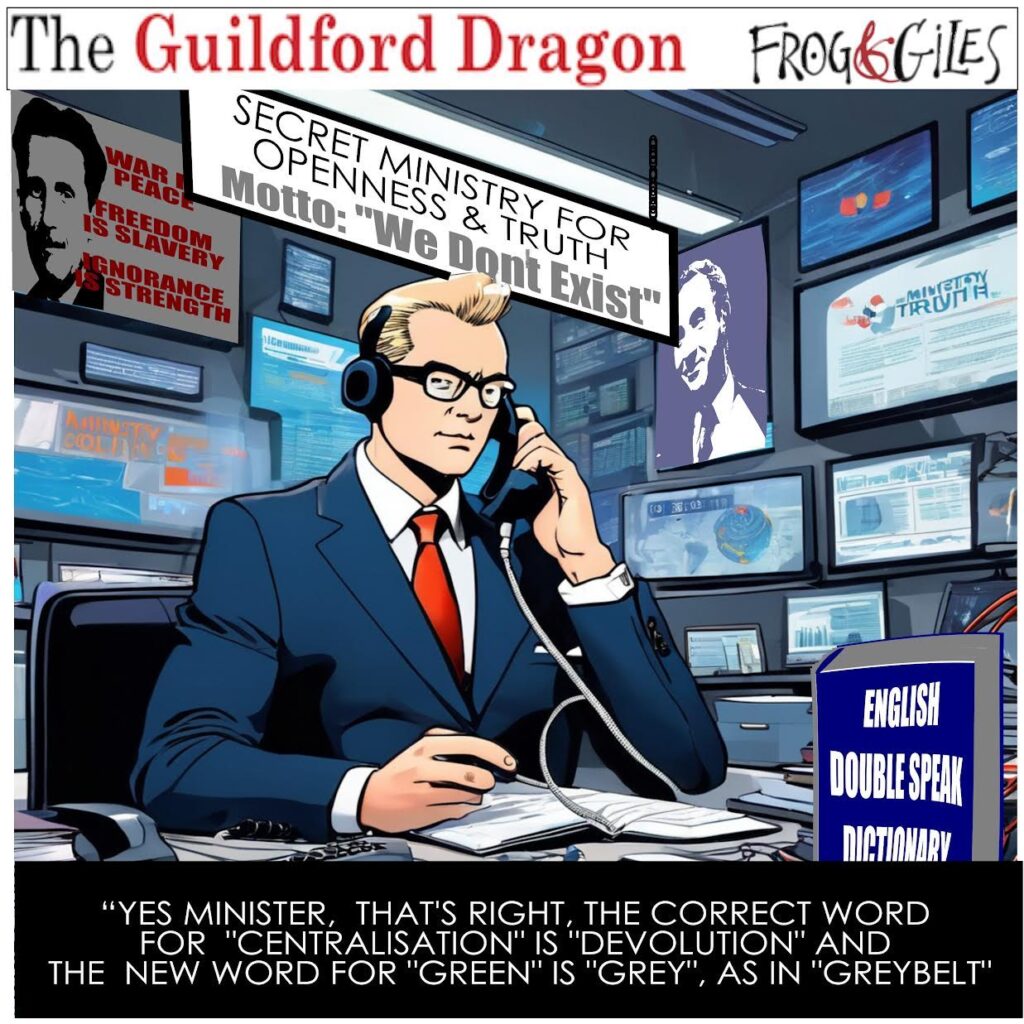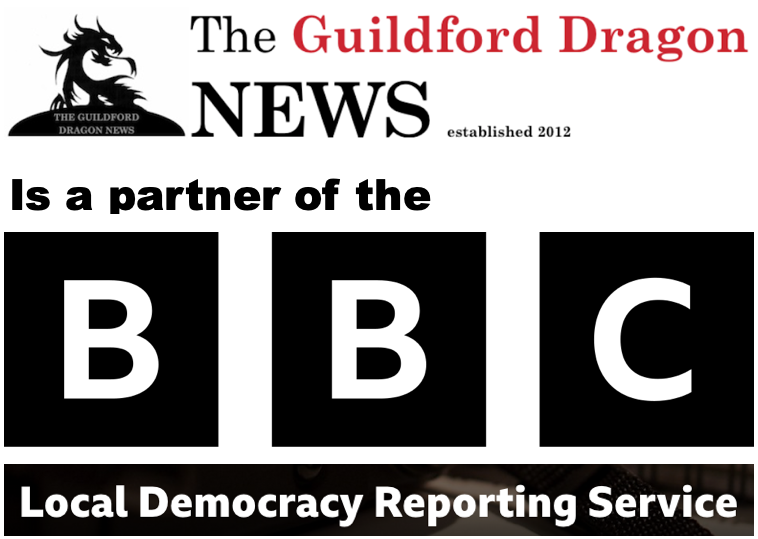- Sunday, July 27, 2025
- Stay Connected
 Abraham Lincoln
If given the truth, the people can be depended upon to meet any national crisis...
Abraham Lincoln
If given the truth, the people can be depended upon to meet any national crisis...
 Guildford news...
for Guildford people, brought to you by Guildford reporters - Guildford's own news service
Guildford news...
for Guildford people, brought to you by Guildford reporters - Guildford's own news service
Dragon Interview: Fracked! Playwright – Alistair Beaton
Published on: 25 Apr, 2017
Updated on: 25 Apr, 2017
Last week the play Fracked! Please Don’t Use the F-word, on the topic – as you’d expect – of fracking, which has prompted angry protest, not least in rural Sussex, received much warm applause throughout its week run at the Yvonne Arnaud Theatre.
Martin Giles tracked down playwright Alistair Beaton to ask him about the play and the reaction it received here in Guildford.
Beaton, a Scot who lives in Holloway, has many credits to his name, including writing for Not The Nine O Clock News and Spitting Image as well as the 2010 Bafta-nominated TV drama The Trial of Tony Blair.
See also: Review: Fracked! – Yvonne Arnaud Theatre
What triggered your writing of Fracked!?
I saw the opportunity to write a play that was both serious and funny and partly because fracking encapsulates all the issues we have with carbon and sustainability and the environment, all of which are very serious subjects, I started some research and found two interesting things. One is that women were in the forefront of the campaign against fracking in most areas and secondly that sometimes they had rather weary downtrodden spouses trailing along behind them. So I thought I could create two characters who are older who would provide us with a human relationship at the heart of the story that is also funny and touching.
How do you know so much about Local Planning?
Well I did quite a lot of research I have taken some liberty with the details of local politics but the broad sweep of it I think is accurate. I did a lot of hard work and on the technical front we had a professor of geophysics who gave me help on getting the technology right. For the stuff on local government I just did a bit of digging myself and tried to turn the dry old material of local government into drama and comedy.
How unhealthy do you think our local democracy system is? Do you think there is really much corruption of the type portrayed?
No I don’t. I think there is incompetence and I think there is probably some corruption. I don’t think there is very much but every drama needs a baddy and I thought the councillor would be a pretty good baddy.
I think the reality of local government is much more that they’re being strangled from Westminster by lack of funds and less and less power. And in the case of fracking of course the government has now reserved the right to call in any decisions of the local planning committees and overrule them. They have already done that once and seem set to do it again. So in the end I am a great believer in local democracy but I needed a villain.
Why did it get such a good reaction from most that saw it here in Guildford? Were you aiming at provincial audiences?
No, I don’t really aim at a particular audience. I write what I want to write because I don’t think that you could ever be sure of getting it right and you never quite know what kind of audience you’ll get. I write in order to reach people and speak to people and then it is down to luck and the market place.

Harry Hadden-Paton (Joe the oil company’s PR man), James Bolam (Jack the husband) and Anne Reid (Elizabeth the objecting campaigner) in Fracked! or Please Don’t Use The F-Word, Photographer Catherine Ashmore
What did you make of the Spectator’s critical review? They said: “This isn’t a satire so much as a hoarse battle cry from an ageing rebel whose student card has morphed into a bus pass… Catch Fracked! while you can… Its days, I fear, are numbered.”
No, they got that wrong. I am always quite pleased to infuriate the right wing press, I think that’s quite satisfying it tends to rile the critics based on what their environmental policies were and it provoked a fury from some on the right. I am fine with that really. If I write contentious satire then I have to be prepared to take it on the chin, and I am fine with that, but there were favourable reviews in the Guardian and The Mail, representing a range of politics, both of whom loved it.
I don’t think it is a left wing play, I think it is a subversive play, it is a play which is on the side of the little people against big forces and I think that is what appeals to people about it. One of the things about fracking that is really interesting is that it has cut across political divides and class divides and age divides and that is fascinating.
I think we are in the midst of a profound shift in national politics. We don’t quite know where we are heading yet especially now we are in the middle of an election, but I think the old traditional positions of left and right are increasingly unclear.
You tackle in the play the hypocrisy of appearing to care about the environment while drinking water shipped from other parts of the world, in bottles made of plastic, derived from oil. Aren’t we all guilty of hypocrisy at times?
Yes. So I can say, I won’t fly short-haul in Western Europe. I will take a train, which is what I do, but on the other hand I eat meat and somebody might say to me that causes more environmental pollution than travelling to Prague for the week – so you’re a hypocrite. And yes, we are all hypocrites but I don’t think that should mean that we can’t do something because in the end in we have to change the politics on the environment.
We all have a duty to try and make our lives a little bit more sustainable and not be afraid of being accused of being hypocrites just because we are only making an effort in one or two areas.
So yes, we are all hypocrites to a degree but it does not mean that it is okay to do nothing.
There is a defence of Nimbyism in the play too…
That’s right, I have the lead character, Elizabeth a professor objecting to Fracking in her village, saying: “Nimbyism is an intellectually defensible position.”
I am sympathetic to that. I don’t see what’s wrong with saying I don’t want an oil well at the bottom of my garden. I think it’s fine. It seems to me we that accusations of Nimbyism are a bit like accusations of political correctness, they’re to stop people acting at all in defence of the environment or in defence of their values and I think we have a right to protect our local area from intrusions that are going to be very unpleasant.
What are your plans for the play now? Are you going to the West End?
Yes, but first we have another five towns to visit over the next six weeks. It’s going to Malvern, Brighton, Bath, Cambridge and Richmond and then we are hoping to go into the West End. But it’s not signed and sealed yet. So we await developments.
















Jim Allen
April 25, 2017 at 5:54 pm
Can we have another one please? Perhaps on the destruction of the green belt!